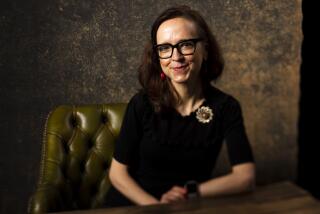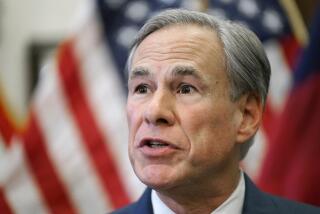Twin Finishes a Distant Second, Joins Brother Born Weeks Ago
- Share via
Lori Abbott has a loooooooong story to tell about the birth of her twins. The 35-year-old Coto de Caza resident delivered the two boys three weeks apart.
The first, Michael Jeffrey, was born at UCI Medical Center in Orange on April 9; the second, Kenneth Roy, was delivered Thursday morning.
Michael was born 15 weeks premature, weighing 1.6 pounds and measuring 12 1/2 inches. He is doing well, doctors said, though he remains on a respirator. His lungs are functioning, but his muscles are too immature to support the lungs’ work.
Kenneth was born at 3:55 a.m. Thursday, weighing 2 pounds, 2 ounces and measuring 14 1/2 inches. He was on a respirator for a few hours but by afternoon was sucking his thumb.
“It was absolutely amazing,” the twins’ father, Robert Abbott, 51. His wife, who had been confined to a hospital bed since before the first twin was born, saw her 21-day-old son for the first time Thursday. Her reaction?
“She cried,” Robert Abbott said.
Medical center officials say that according to medical literature, Abbott’s case is the second-longest interval between twin deliveries in which both babies lived.
While there are no official statistics on what UCI doctors are calling “intentional delayed delivery of a second twin,” news stories show there has been at least one other case involving a longer delay.
Twins were born 95 days apart in October 1994 and January 1995 in New Orleans, according to an Associated Press story. The first breathed with a respirator for his first seven weeks. The Chicago Tribune reported that twin brothers were born 92 days apart in October 1996 and January 1997, though the firstborn suffered severe complications from his prematurity.
The Orange County twins, born at 25 and 28 weeks’ gestation, are in the hospital’s infant special-care unit, but neither has suffered complications associated with prematurity, such as bleeding in the brain.
Delayed birth of a second twin can be attempted only when the twins are fraternal, meaning that each has its own amniotic sac and placenta in the womb, doctors said.
Lori Abbott went into premature labor more than a month ago, said Dr. Manuel Porto, director of maternal-fetal medicine at the medical center. She was admitted to the hospital on March 31 and given drugs to halt contractions. At that point, Abbott was in her 24th week of pregnancy, and the chances for the babies’ survival were, Porto said, “marginal at best.”
Abbott was restricted to bed rest with her feet raised to take pressure off the cervix, while obstetrical and neonatal doctors conferred about their options, including the possibility of delivering one twin and attempting to delay the second.
On April 9, fetal monitors indicated that one twin’s heartbeat was slowing to a dangerous rate, he said. Not only was Abbott’s cervix dilating, but Michael was entering the birth canal, feet first.
After Michael was delivered, Dr. Stephen Wold tied and cut the umbilical cord as close to Abbott’s uterus as possible to prevent infection. The new mother was positioned head down to once again take pressure off her cervix, and she was given medication.
Everyone waited. And waited. And waited.
When the second twin didn’t insist on making an immediate appearance, Abbott was sent back to her hospital room, where she was not allowed to get up, even to use the bathroom.
“We were delighted just to get through the first week,” Porto said.
Robert Abbott, meanwhile, was visiting Michael in the special-care nursery, touching the baby in the incubator every day, taking videos to show Lori, and helping to keep her spirits up.
He slept in her hospital room every night, rising to drive to work at Raytheon Systems Co. in San Diego, where he is a contracts manager.
Then early Thursday morning, Lori Abbott suddenly went into labor again. Kenneth was born and was able to rejoin his 21-day-old twin.
While both babies are doing well, they are at risk for complications for several more weeks, said Dr. Feizal Waffern, chief of neonatal-perinatal medicine.
Robert Abbott, who also has a grown daughter and son from a previous marriage, said this has been quite a month.
His daughter had a baby--making him a grandfather--three days before Michael was born.
Asked how he will explain to his young sons one day how they can be twins with birthdays three weeks apart, he replied: “We’ll say it was just a miracle.”
More to Read
Sign up for Essential California
The most important California stories and recommendations in your inbox every morning.
You may occasionally receive promotional content from the Los Angeles Times.












